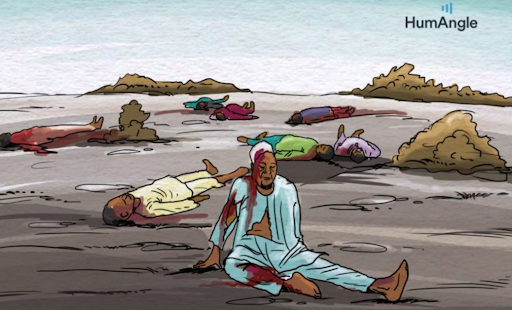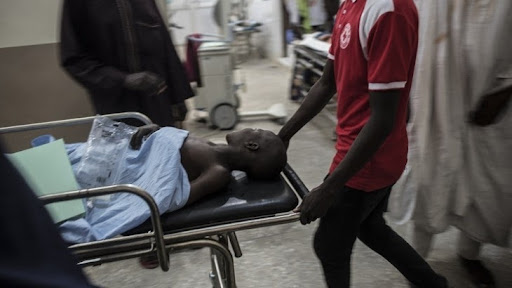Nigeria’s Use Of Airstrikes For Security Operations Puts Civilians At Risk
Airstrikes used by the Nigerian military to confront increasing insecurity in Nigeria's north have resulted in civilian casualties. Authorities are yet to publicly reveal the outcome of inquiries and measures taken to prevent recurrence.

The Nigerian government is rapidly increasing investment and use of military aircraft to support the growing militarisation of internal security operations as the country grapples with insecurity and violence.
The approach has, however, contributed to civilian casualties as loss of innocent lives during military operations is fast becoming the norm. This is despite the fact that citizens in the northern region of the country have gone through a lot in the hands of terrorists.
While the government speaks glowingly about their efforts to end insurgency through the acquisition of military aircraft, the government and military authorities play down the killings and injuries inflicted on defenceless civilians.
In some of the cases that triggered public outrage, authorities failed to publicly release the outcome of inquiries into incidents of civilian deaths.
This is despite the fact that under international humanitarian law, which Nigeria is a party to, security forces must take all feasible precautions to minimise harm to civilians, and unless circumstances do not permit, provide effective advance warnings of attacks.
The Northeast has in the last five years recorded at least five incidents involving airstrikes that have led to civilian casualties. Aside from deaths, insurgence has led to a severe humanitarian crisis.
According to the UN refugee agency, over 2 million people have been displaced due to conflict in the Northeast, making it one of the world’s most complex humanitarian emergencies. For many, they struggle to meet their essential needs as IDPs.
On Sept. 26, 2021, 20 civilians reportedly died from an airstrike in Dabar Masara, a town in Monguno Local Government Area (LGA) of Borno State.
The incident occurred days after an earlier airstrike killed 10 people in Buwari community of Yobe State. Residents said 10 people were killed and at least 19 injured.

Reacting to the incidents, Amnesty International called for reparations for the relatives of those killed in the strikes, as well as remedy for other victims in previous military air strikes – including compensation, restitution, and rehabilitation.
The human rights organisation warned that the military must abide by international law in future operations and protect the lives of civilians.
Previous incidents
On July 13, 2021, airstrikes from the military’s fighter jets aimed at terrorists reportedly killed a woman and her four children at Sububu, in Zamfara State.
A book published by the Wall Street Journal reporters, Joe Parkinson and Drew Hinshaw, in March 2021, revealed that in Aug. 2016, a Nigerian military Alpha fighter jet launched an airstrike on a target believed to be Boko Haram headquarters but the rocket left at least 40 of the Chibok schoolgirls dead or wounded. Sadly, the attack did not make the military’s public press briefings. It was kept under wraps.
In an investigative piece published on May 8, 2021, the ICIR revealed how airstrikes by the military in the northwestern state of Zamfara, a region plagued by violence involving terror groups locally called bandits, killed and injured many civilians, leading to forced displacement of residents.
Ruqayat Umaru, a six-year-old girl who was a victim of one of the many airstrikes in the state died at Tangaram in Wuya ward of Anka LGA in Feb. 2020 after a plank fell on her left arm while running for safety.
For Abubakar Magaji, he recalled that no fewer than 11 people were killed and 20 others injured from six airstrikes launched on April 9, 2019 in Dumbourou in Zurmi LGA.
More cases…
In Jan. 2017, Nigeria’s military fighter jet mistakenly bombed a refugee camp in Rann, Borno State. The incident which occured at the epicentre of Boko Haram insurgency, killed no fewer than 50 people and wounded at least 120.
The airstrike, according to the military, was on a mission against Boko Haram fighters when it struck the camp.
On Dec. 4, 2017, the military sent a fighter jet to fire rockets at villages as a “warning” to deter spiraling communal violence, as hundreds of terrorists attacked five villages in Adamawa State. Amnesty International said its team which visited the state after the airstrike confirmed that armless residents were attacked by the fighter jet as they attempted to flee.

“The helicopter and the jet started releasing bombs. Houses started burning. Children started running for their lives. Mothers packed up their children and escaped with them. We men were unable to fight back and we started running too. This jet burnt our houses and properties to ashes,” a farmer quoted by Amnesty International said.
Abuse of law
The aforementioned among many others continue to have great humanitarian consequences as against the Geneva Conventions of 1949 on rules that apply to safety of civilians during armed conflict.
The convention provides for the safety of persons taking no active part in hostilities and it states in Act 4 that unarmed civilians are entitled, in all circumstances, to respect for their persons, their honor, their family rights, their religious convictions and practises, and their manners and customs.
“They shall at all times be humanely treated, and shall be protected especially against all acts of violence… Women shall be especially protected against any attack on their honour, in particular against rape, enforced prostitution, or any form of indecent assault.”
Attacks or other acts carried out in violation of these prohibitions are considered grave breaches of humanitarian law and classified as war crimes.
Nigeria is a party to both the four Geneva Conventions of Aug. 12, 1949 and the two Additional Protocols of 1977. Having adopted the basic foundation of International Humanitarian Law, the nation failed to regulate the activities of her combatants, breaching citizens’ rights.
HumAngle understands that preventing civilian casualties and damage to properties is an essential component of winning hearts and minds but this has been hampered by some factors including the militarisation of internal security as a result of inefficient policing and the lack of sufficient capacity to mitigate civilian casualties.

Security experts said the unlawful killings and displacement of unarmed citizens by airstrikes is a result of poor intelligence and techniques in the military. Ben Okezie, a security consultant and analyst said “the military are still lagging behind when it comes to intelligence. It is still sad that there is no synergy between the airforce and soldiers.
“The jet fighters attack civilians mostly because there is a lack of proper planning. There will always be an abuse of fundamental human rights of civilians until we seek to create mechanisms that minimize mistakes and verify legitimate targets.”
The military have said on several occasions that it would investigate these incidents but no findings have ever been shared with the public. The security operatives have also not spoken on measures put in place to reduce civilian casualties.
For two days, HumAngle reached out to the defence headquarters for comments and reactions to the continuous breach of civilians’ rights through military airstrikes but its spokesperson, Jimmy Akpor, did not respond to our reporter’s calls and text messages.
Support Our Journalism
There are millions of ordinary people affected by conflict in Africa whose stories are missing in the mainstream media. HumAngle is determined to tell those challenging and under-reported stories, hoping that the people impacted by these conflicts will find the safety and security they deserve.
To ensure that we continue to provide public service coverage, we have a small favour to ask you. We want you to be part of our journalistic endeavour by contributing a token to us.
Your donation will further promote a robust, free, and independent media.
Donate HereStay Closer To The Stories That Matter




